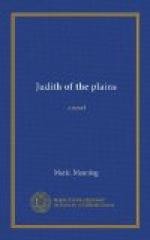The left fork of the road had a meaner destiny. It dipped straight into desolation, penetrating a naked wilderness where bad men skulked till the evil they had done was forgotten in deeds that called afresh to Heaven for vengeance. It was well away on this west fork of the road that they lynched Kate Watson—“Cattle Kate”—for the crime of loyalty. It was she, intrepid and reckless, who threatened the horde of masked scoundrels when they came to lynch her man for the iniquity of raising a few vegetables on a strip of ground that cut into their grazing country. And when she, recognizing them, masked though they were, threatened them with the vengeance of the law, they hanged her with her man high as Haman.
Judith watched Hamilton with narrowing eyes. And now she was all Indian, the white woman in her dead. Only the Sioux watched, and, in the patient, Indian style, bided its time. “Cattle thieves,” “the girl at Wetmore’s”—the words sang themselves in her head like an incantation. “Cattle thieves” meant her brother, their recognized leader—her brother, who was dearer to her than the heart in her breast, the eye in her head, the right hand that held together the shambling, uncertain destiny of her people. Would he turn to the left, Justice, on a pale horse, hunting her brother gallowsward? Would he turn towards the right, the impetuous lover spurring his steed that he might come swiftly to the woman. A pulse in her bosom rose slowly until her breath was suspended, then fell again; she was still watching, without an outward quiver, long after he had turned to the right—and the woman.
VI
A Daughter Of The Desert
Judith knew that the name of the girl whose letter sent Peter Hamilton vaulting to the saddle was Katherine Colebrooke. There had been a deal of letter-writing between her and the young cow-puncher of late, of which perforce, by a singular irony of fate, the postmistress had been the involuntary instrument. The correspondence had followed a recent hasty journey to New York, undertaken somewhat unwillingly by Hamilton in the interest of certain affairs connected with the settlement of an estate.
The precipitancy of this latest turn of events bewildered Judith; but yet a little while—a matter of weeks and days—and her friendship with Hamilton had been of that pleasantly indefinite estate situated somewhere on the borderland of romance, a kingdom where there is no law but the mutual interest of the wayfarers. Judith and Peter had been pitifully new at the game of life when the gods vouchsafed them the equivocal blessing of propinquity. Judith was but lately come from the convent at Santa Fe, and Hamilton from the university whose honors availed him little in the trailing of cattle over the range or in the sweat and tumult of the branding-pen. It was a strange election of opportunity for a man who had been class poet and had rather conspicuously




